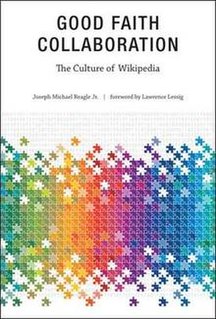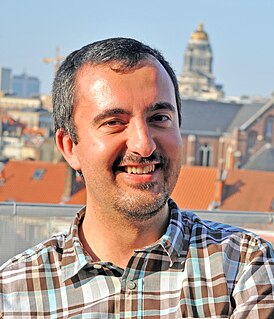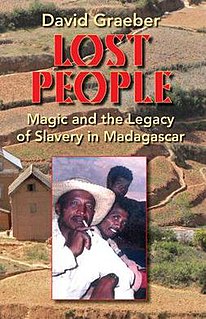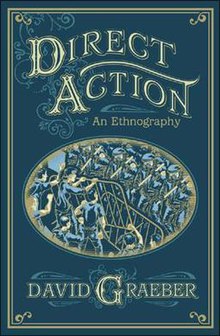
Freeganism is an ideology of limited participation in the conventional economy and minimal consumption of resources, particularly through recovering wasted goods like food. The word "freegan" is a portmanteau of "free" and "vegan". While vegans avoid buying animal products as an act of protest against animal exploitation, freegans—at least in theory—avoid buying anything as an act of protest against the food system in general.
Critical discourse analysis (CDA) is an interdisciplinary approach to the study of discourse that views language as a form of social practice. Scholars working in the tradition of CDA generally argue that (non-linguistic) social practice and linguistic practice constitute one another and focus on investigating how societal power relations are established and reinforced through language use. In this sense, it differs from discourse analysis in that it highlights issues of power asymmetries, manipulation, exploitation, and structural inequities in domains such as education, media, and politics.

David Rolfe Graeber was an American anthropologist and anarchist activist. His influential work in economic anthropology, particularly his books Debt: The First 5000 Years (2011) and Bullshit Jobs (2018), and his leading role in the Occupy movement, earned him recognition as one of the foremost anthropologists and left-wing thinkers of his time.
Cyber-ethnography, also known as virtual ethnography, digital ethnography and most commonly online ethnography, is an online research method that adapts ethnographic methods to the study of the communities and cultures created through computer-mediated social interaction. As modifications of the term ethnography, cyber-ethnography, online ethnography and virtual ethnography designate particular variations regarding the conduct of online fieldwork that adapts ethnographic methodology. There is no canonical approach to cyber-ethnography that prescribes how ethnography is adapted to the online setting. Instead individual researchers are left to specify their own adaptations. Netnography is another form of online ethnography or cyber-ethnography with more specific sets of guidelines and rules, and a common multidisciplinary base of literature and scholars. This article is not about a particular neologism, but the general application of ethnographic methods to online fieldwork as practiced by anthropologists, sociologists, and other scholars.
Prefigurative politics are the modes of organization and social relationships that strive to reflect the future society being sought by the group. According to Carl Boggs, who coined the term, the desire is to embody "within the ongoing political practice of a movement [...] those forms of social relations, decision-making, culture, and human experience that are the ultimate goal". Prefigurativism is the attempt to enact prefigurative politics.
The following events related to sociology occurred in the 1980s.
Ethnofiction refers to a subfield of ethnography which produces works that introduces art, in the form of storytelling, "thick descriptions and conversational narratives", and even first-person autobiographical accounts, into peer-reviewed academic works.

Good Faith Collaboration: The Culture of Wikipedia is a 2010 book by Joseph M. Reagle Jr. that deals with the topic of Wikipedia and the Wikipedia community. The book was first published on August 27, 2010, through the MIT Press and has a foreword by Lawrence Lessig. The book is an ethnographic study of the history of Wikipedia, its real life and theoretical precursors, and its culture including its consensus and collaborative practices.

Noel B. Salazar is a sociocultural anthropologist known for his transdisciplinary work on mobility and travel, the local-to-global nexus, discourses and imaginaries of 'Otherness', heritage, cultural brokering, cosmopolitanism and endurance.
This bibliography of anthropology lists some notable publications in the field of anthropology, including its various subfields. It is not comprehensive and continues to be developed. It also includes a number of works that are not by anthropologists but are relevant to the field, such as literary theory, sociology, psychology, and philosophical anthropology.

The Utopia of Rules: On Technology, Stupidity, and the Secret Joys of Bureaucracy is a 2015 book by anthropologist David Graeber about how people "relate to" and are influenced by bureaucracies. Graeber previously wrote Debt: The First 5000 Years and The Democracy Project, and was an organizer behind Occupy Wall Street. Graeber signed a book deal with Melville House toward the end of 2014, and The Utopia of Rules was released on February 24, 2015.

The Democracy Project: A History, a Crisis, a Movement is anthropologist David Graeber's 2013 book-length, inside account of the Occupy Wall Street. Graeber evaluates the beginning of the movement, the source of its efficacy, and the reason for its eventual demise. Interspersed is a history of democracy, both direct and indirect, throughout many different times and places. In contrast to many other evaluations of OWS Graeber takes a distinctly positive tone, advocating both for the value of OWS and its methods of Direct democracy. The book was published by Spiegel & Grau.

Toward an Anthropological Theory of Value: The False Coin of Our Own Dreams is a 2002 book-length synthesis of cultural, economic, and political theories of value, written by anthropologist David Graeber and published by Palgrave.

Lost People: Magic and the Legacy of Slavery in Madagascar is a 2007 book-length ethnographic study of Betafo, Madagascar written by anthropologist David Graeber and published by the Indiana University Press.

Pretty Modern: Beauty, Sex, and Plastic Surgery in Brazil is a book by anthropologist Alexander Edmonds published by Duke University Press in 2010. Edmonds examines plastic surgery as a social domain and uses it to explore the social, medical and psychological landscape and conflicts in modern-day Brazil. In this book, he seeks to answer the question "how did plastic surgery—a practice often associated with body hatred and alienation—take root in this city known for its glorious embrace of sensuality and pleasure?” He examine what constitutes a perfect Brazilian body and how the social and racial dynamic of Brazil affect this.

The Mushroom at the End of the World: On the Possibility of Life in Capitalist Ruins is a 2015 book by the Chinese American anthropologist Anna Lowenhaupt Tsing. The book describes and analyzes the globalized commodity chains of matsutake mushrooms.

The Doon School Quintet is a five-part ethnographic film series made by the American visual anthropologist and documentary filmmaker David MacDougall, between 1997 and 2000, at The Doon School, an all-boys boarding school in India. For thirteen months over three years, MacDougall lived with the students and was given unprecedented access for filming inside the residential campus. By the end, MacDougall had more than 85 hours of material, which he edited into 5 parts, with a total duration of about 8 hours. The project ranks among MacDougall's most ambitious and longest works and is the only film series in his oeuvre.

Yarimar Bonilla is a Puerto Rican political anthropologist, author, columnist, and professor of anthropology and Puerto Rican studies at Hunter College and the Graduate Center of the City University of New York. Bonilla’s research questions the nature of sovereignty and relationships of citizenship and race across the Americas.
David Graeber was an American anthropologist and social theorist. Unless otherwise noted, all works are authored solely by David Graeber.












